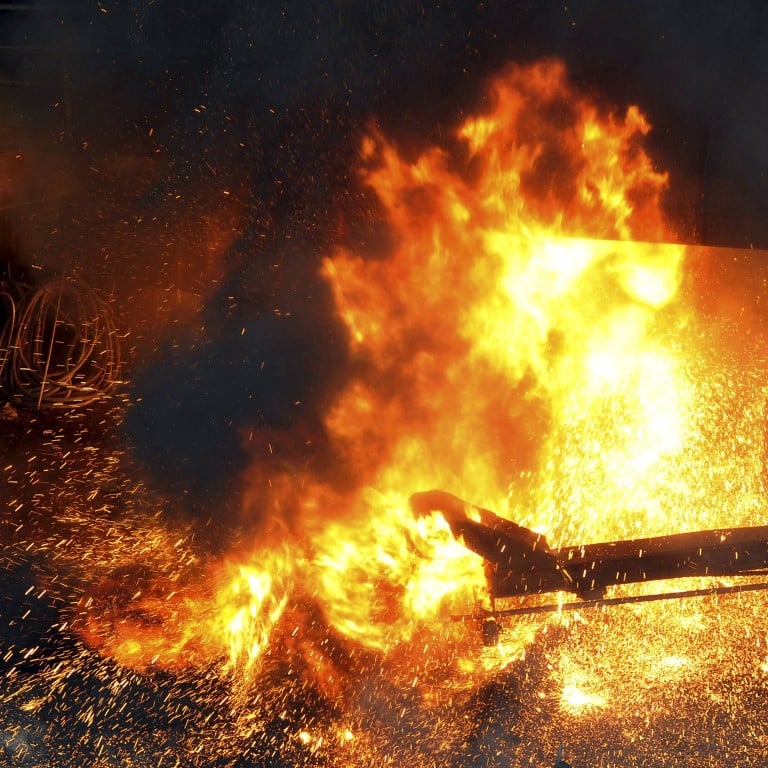
Can China's new economy outrun the drag of zombie companies?
China's economic modernisation is under threat from troubled firms that stalk its industrial landscape feeding off the nation's financial resources
This year's first-half reporting season for Chinese companies introduced a new sport for the analyst community: spot the zombies.
These are the companies that should be dead but are still feeding off the country's financial resources: kept afloat for fear that collective bankruptcies would cause panic, cost jobs or upset entrenched power brokers.
Most suspected zombies are in the heavy industries that spearheaded China's transformation into a modern industrial state.
Chongqing Iron and Steel offers an apt example. This state-owned enterprise posted a net loss of 2.2 billion yuan in the first half of this year, the biggest in a string of recent losses. But it gets a little help: it has received cash infusions from its unlisted state-owned parent of 2.5 billion yuan.
Yanzhou Coal Mining is another eyebrow-raiser, with its 2 billion yuan deficit in operating cash flow in the first half alone.
"The press has written extensively about zombie companies stalking China's industrial landscape. We believe Yanzhou Coal has joined this unfortunate lot," Jeffries analysts said in a recent report.
Like other troubled industrial firms, Yanzhou Coal is trying to improve efficiency and cut costs. There is talk that it would be merged with ChinaCoal to achieve economies of scale and take out some overcapacity.
But Jeffries notes that much of Yanzhou Coal's purported cost cutting is just capital engineering. And as cash generation has dried up, the firm has issued a series of perpetual capital securities - where interest payments to bondholders can be postponed as needed. "Who's buying these things?" the broker asked.
Then there is shipping. Comparative financial analysis by Goldman Sachs shows Chinese shippers enjoy cheaper financing costs than regional competitors but earn lower returns on capital: the classic zombie diet and profile.
Charles de Trenck, an analyst and consultant in the logistics and transport sector, says that Chinese shippers have not only historically been given privileged access to financing, but also received "every form of kitchen sink assistance on top, from lower-cost ship replacements to higher margin opportunities in dealing with Chinese government red tape".
However, the sector is no longer expanding; in fact it is cutting fleets and last month, Cosco Pacific and China Shipping Container Lines said they were considering a merger. De Trenck thinks it is possible that these two "failures" could be combined into "a national champion that will hold its own" against top players.
One rationale for propping up loss-making companies is to keep them viable until there is a recovery; many countries practise this - for example, the US car sector bailout of 2009.
In China's case, the goals are a bit more complex. No one expects demand for heavy industrial will ever meet the voracious levels seen during the country's catch-up development phase.
The trick is to gradually wind down capacity in this "old economy" and hope the "new economy" - services and consumption - takes over the momentum.
There are some who still think China can pull this off. They point to restraint in corporate capital expenditure in the old economy, and buoyant sales in "new economy" items such as smartphones, movie tickets, travel and financial services.
Bernstein, the investment bank, created the accompanying chart to gauge the Chinese economy's overall efficiencies and strategy. It uses nominal gross domestic product minus labour costs as a proxy for returns to capital, and divides that by cumulative fixed asset investment to measure returns on assets.
Returns on investment spending were fantastic for many years but have been declining for nearly a decade. What to do? China needs to reduce investment and cut leverage, expand services and convince consumers that they should feel confident enough in the future to spend, spend, spend: which is roughly China's stated policy of economic reforms.
"If it works, China becomes a modern, developed economy and will have wisely pulled forward a tremendous amount of infrastructure investment while labour and capital were cheap," writes Bernstein regional strategist Michael Parker.
"If it fails," Parker adds, "China will be left with the consequences of misallocated capital … a massive debt that it is unable to service, and a discontented population wondering where the good times went."
In short, the question is whether the new economy can outrun the zombies.

